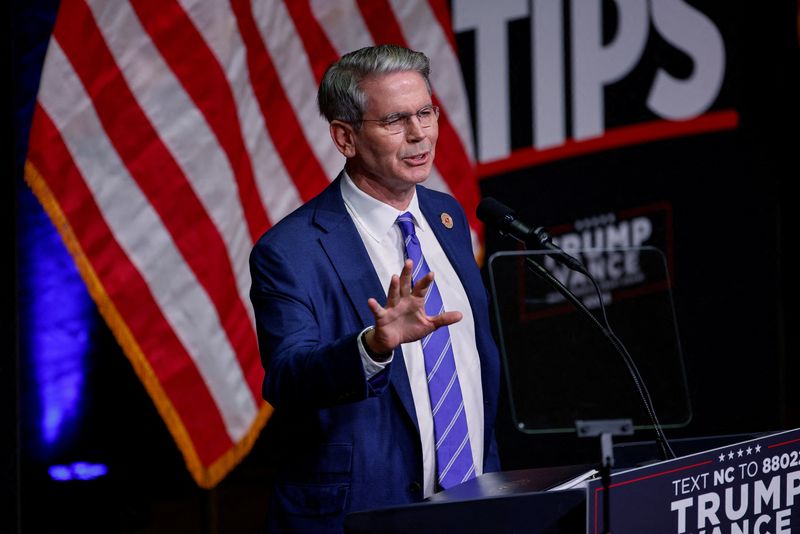
Nov. 24—As President-elect Donald Trump continues to roll out a flurry of nominees for Cabinet-level positions, one name on the Republican’s roster has environmental advocates fearing the possible effects on New Mexico’s ambitious renewable energy transition.
Fossil fuel executive and climate policy critic Chris Wright, Trump’s pick to lead the U.S. Department of Energy, said in a video posted to the social media website LinkedIn in 2023, “There is no climate crisis, and we’re not in the midst of an energy transition, either.”
He has argued the climate movement around the world is “collapsing under its own weight,” and he supports ramping up oil and gas development.
Advertisement
Advertisement
Former U.S. Rep. Lee Zeldin, a New York Republican tapped to be Trump’s Environmental Protection Agency administrator, also has vowed to support the incoming president’s goal of “energy dominance.”
The potential impacts of the Trump administration — combined with an incoming Republican majority in both chambers of Congress and a conservative Supreme Court — on initiatives supporting a renewable energy transition, such as environmental protections and appropriations creating incentives for decarbonization, are not yet clear. Some environmental advocates in New Mexico have expressed confidence in the state’s ability to continue its effort, which they said is driven by economic forces as well as policies. Most, however, hold grave concerns in the nation’s second largest oil-producing state in the nation.
Advocates agree the keys to ensuring the energy transition away from fossil fuels moves forward are strong state policies.
“Unfortunately, I think pretty much every bedrock environmental rule and protection is on the chopping block, and it will be up to us to protect those rules,” said Camilla Feibelman, director of the Sierra Club’s Rio Grande Chapter. “And if we don’t, people’s health and pocketbooks are on the line in an exaggerated climate crisis.”
Advertisement
Advertisement
Feibelman pointed to stronger hurricanes this year, as well as longer droughts that lead to wildfires like the devastating Hermits Peak/Calf Canyon Fire, a historic wildfire that burned more than 340,000 acres of Northern New Mexico in 2022.
“People can continue this ideological mumbo jumbo about, ‘There’s no climate change,’ or, you know, ‘We should stick to fossil fuels,’ but the economics just don’t show that,” she said.
“I think that the technology and the economics will outweigh whatever ideological gamesmanship this administration will carry out,” she added.
Feibelman noted all three of New Mexico’s privately owned utilities are currently exceeding renewable energy goals laid out in the New Mexico Energy Transition Act of 2019. More than 60% of the electricity produced by Public Service Company of New Mexico, which supplies power to more than half a million customers in the state, is carbon free, and the utility is on track for 100% carbon-free energy by 2040, according to its website.
Advertisement
Advertisement
More in Politics
The law requires electric utilities to generate 50% of their power from renewable sources by 2030 and 80% by 2040. Investor-owned utilities must reach 100% renewable sources by 2045 and rural electric cooperatives by 2050.
Risks to Inflation Reduction Act programs
Perhaps one of the biggest threats to clean energy and energy-efficiency programs in New Mexico is Trump’s pledge in recent months to rescind “all unspent funds” from the federal Inflation Reduction Act.
The 2022 law authorized hundreds of billions of dollars for energy and environmental initiatives, including clean energy development, electric vehicle tax credits and energy-efficiency upgrades.
Advertisement
Advertisement
Clara Sims, assistant executive director of Interfaith Power & Light, said the organization has worked for decades to help faith communities in New Mexico and El Paso complete energy-efficiency audits and install solar panels but the “direct pay” provisions in the Inflation Reduction Act have prompted a rapid rise in faith communities going green.
The direct pay, or elective pay, program allows tax-exempt nonprofits and government entities to receive a payment for up to 30% of their solar installation costs the year after installation. Sims said her organization has worked with five faith groups that are in the process of using the tax credit.
“My sense is that the faith communities who maybe don’t have the same kind of budget capacity that others did in the past have been able to really push that forward in their congregations or houses of worship in the past several years,” Sims said.
“So,” she added, “that’s certainly a concern for us in terms of looking ahead to the potential of really rolling back the money that’s available.”
Advertisement
Advertisement
Another Inflation Reduction Act program that offers point-of-sale rebates for energy-efficient home and appliance upgrades for low- and middle-income households began in New Mexico in early September. Sims said her organization is planning to hit the ground with outreach about the program in December.
“We will certainly continue to pursue that work for as long as there is federal funding available, but that’s become a much more uncertain landscape,” she said.
New Mexico became the third state to offer the Home Electrification and Appliance Rebates program through the Inflation Reduction Act this year. Gov. Michelle Lujan Grisham said in a September statement New Mexico is also the first state to offer the rebates at the point of sale.
Albuquerque City Councilor Tammy Fiebelkorn, an environmental economist, attributed the “quick work” of the state Energy, Minerals and Natural Resources Department for the state being “ahead of the curve” nationwide on the rebate program.
Advertisement
Advertisement
“I just think it’s hard to stop something that’s already rolling and helping people,” Fiebelkorn said. “You know, the momentum is there on our program now.”
Stefi Weisburd, who works with the environmental advocacy group 350 New Mexico, noted in an email the EnergySmart Academy program at Santa Fe Community College recently received support for cold-climate heat pump and energy auditor training for more than 180 people through the Inflation Reduction Act.
“Cut off the incentives for these clean energy measures and accelerate unregulated fossil fuel development like Trump promises and we’re pushed back decades as temperatures continue to rise,” Weisburd wrote.
She added, “We are just starting to roll out the IRA electrification programs, to understand the practical barriers to electrification, and we’re still learning how to reach out to the public and contractors.”
Advertisement
Advertisement
‘States are going to have to step up’
Environmental advocates see the state’s handling of environmental and climate issues as critical during a presidential administration that promises to be hostile to their cause.
Mariel Nanasi, executive director of Santa Fe-based advocacy group New Energy Economy, said she believes a decadeslong decline in federal regulation of corporations, utilities and the environment will be “supercharged” during the coming Trump administration, disproportionately affecting “the most vulnerable populations.”
Nanasi pointed to a rule change during Trump’s first term in 2020 that reduced federal review of environmental impacts of large infrastructure projects — like highway construction — under the National Environmental Policy Act.
Advertisement
Advertisement
“That’s why we need New Mexico’s regulatory bodies to be more vigilant than ever before, so that we don’t have bad behavior from corporations with no power to correct that,” she said. “The states are going to have to step up and take more responsibility to protect our air, water and land.”
The Sierra Club’s Feibelman praised “nation-leading methane and ozone rules” in New Mexico as well as clean car rules and updated building codes, but said “we have to do more,” given the emissions that continue from the state’s oil and gas drilling industry.
“Our state’s doing a great job,” Feibelman said. “Our big challenge is that because we’re the second largest extractor of oil in the entire country, and we rank globally, the goalposts just keep getting moved out further and further.”
EMEA Tribune is not involved in this news article, it is taken from our partners and or from the News Agencies. Copyright and Credit go to the News Agencies, email news@emeatribune.com Follow our WhatsApp verified Channel




